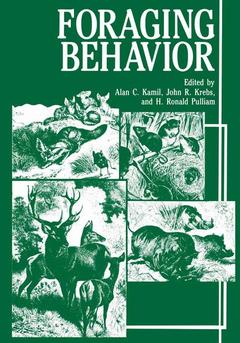Foraging Behavior, Softcover reprint of the original 1st ed. 1987
Langue : Anglais
Coordonnateurs : Kamil A.C., Krebs J.R., Pulliam H.R.

Foraging behavior has always been a central concern of ecology. Understanding what animals eat is clearly an essential component of under standing many ecological issues including energy flow, competition and adaptation. Theoretical and empirical developments in the late 1960's and 1970's led to a new emphasis in the study of foraging behavior, the study of individual animals in both field and laboratory. This development, in turn, led to an explosion of interest in foraging. Part of the reason for this explosion is that when foraging is studied at the individual level, it is relevant to many disciplines. Behaviorists, including ethologists and psychologists, are interested in any attempt to understand behavior. Ecologists know that a better understanding of foraging will contribute to resolving a number of important ecological issues. Anthropologists and others are applying the ideas coming out of the study of foraging behavior to problems within their disciplines. These developments led to a multidisciplinary symposium on foraging behavior, held as part of the 1978 Animal Behavior Society meetings in Seattle, Washington. Many ecologists, ethologists and psychologists participated or attended. The symposium was very successful. generating a high level of excitement. As a result, the participants decided to publish the proceedings of the symposium (Kami1 & Sargent 1981).
Optimal Foraging Theory.- A Brief History of Optimal Foraging Ecology.- Faith and Foraging: A Critique of the “Paradigm Argument from Design”.- The Problem of Selectivity.- A Test of the Energy Maximization Premise of Optimal Foraging Theory.- Delivering Food to a Central Place: Three Studies of Bee-Eaters MeropsApiaster.- Operant Conditioning Simulations of Foraging and the Delay-Reduction Hypothesis.- Foraging Behavior of Some Wintering Waders: Prey-Selection and Habitat Distribution.- Foraging Time Constraints and Diet Choice.- Patch Utilization.- Stochastic Models of Optimal Foraging.- Starlings and Optimal Foraging Theory: Modelling in a Fractal World.- Tests of Optimal Foraging Using an Operant Analogue.- Competition for Non-Depleting Resources: The Ideal Free Distribution in Sticklebacks.- Foraging Games in a Random Environment.- The Reproductive Consequences of Foraging.- Reproductive Consequences of Dietary Specialization and Switching in an Ecological Generalist.- The Consequences of Foraging for Reproductive Success.- Parents, Nestlings and Feedings Frequency: A Model of Optimal Parental Investment and Implications for Avian Reproductive Strategies.- Learning and Foraging.- The Role of Learning in Honey Bee Foraging.- Adaption to Reward.- Signal Detection Theory and Foraging for Cryptic or Mimetic Prey.- Foraging Theory and Design.- Should Foragers Remember Where They’ve Been? Explorations of a Simulation Model Based on the Behavior and Energetics of Territorial Hummingbirds.- Randon and Systematic Foraging, Experimental Studies of Depletion and Schedules of Reinforcement.- Caching Behavior.- Cache-Protecting Behavior of Food-Hoarding Animals.- Cache Site Memory in Birds.
Date de parution : 11-2011
Ouvrage de 676 p.
17.8x25.4 cm
Disponible chez l'éditeur (délai d'approvisionnement : 15 jours).
Prix indicatif 105,49 €
Ajouter au panierThème de Foraging Behavior :
Mots-clés :
© 2024 LAVOISIER S.A.S.



